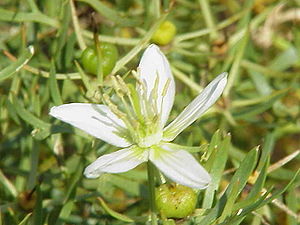Peganum harmala
ἀκίνδυνοι δ' ἀρεταὶ οὔτε παρ' ἀνδράσιν οὔτ' ἐν ναυσὶ κοίλαις τίμιαι → but excellence without danger is honored neither among men nor in hollow ships
Latin > Greek
ἁρμαλά, ἀρμαρά, ἄρμαρα, ἄρμολα, πήγανον ἄγριον, βήσσασα
Wikipedia EN
Peganum harmala, commonly called wild rue, Syrian rue, African rue, esfand or espand, or harmel (among other similar pronunciations and spellings), is a perennial, herbaceous plant, with a woody underground rootstock, of the family Nitrariaceae, usually growing in saline soils in temperate desert and Mediterranean regions. Its common English-language name came about because of a resemblance to rue (to which it is not related). Because eating it would sicken or kill livestock, it is considered a noxious weed in a number of countries. It has become an invasive species in some regions of the western United States. The plant is popular in Middle Eastern and north African folk medicine. The alkaloids contained in the plant, including the seeds, are monoamine oxidase inhibitors (harmine, harmaline).

